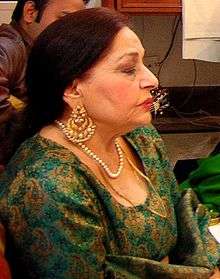Farida Khanum
Farida Khanum (Urdu/Punjabi: فرِیدہ خانُم ) is a Pakistani classical singer from the province of Punjab. She is one of the few female singers of Pakistan who have had classical music training. She was conferred with the title of Malika-e-Ghazal (ملِکۂ غزَل; Queen of Ghazal) by The Times of India in 2007.[1][2]
Farida Khanum فرِیدہ خانُم | |
|---|---|
 Farida Khanum rehearsing in December 2005 | |
| Background information | |
| Birth name | Farida Khanum |
| Born | 1929 (age 90–91) Kolkata, British India |
| Genres | Ghazal • Dadra • Khyal • Thumri |
| Occupation(s) | Singer |
| Years active | 1949–2015 |
| Labels | Coke Studio Pakistan PTV Radio Pakistan |
| Associated acts | Amanat Ali Khan • Noor Jehan |
Early life
She was born in the fall of 1929 in Kolkata, British India. She had four siblings, a sister and three brothers. Her sister is the famous singer, Mukhtar Begum. Their whole family moved from Amritsar, British India to Lahore, Pakistan when she was 18 years old.[3]
She started learning Khayal, Thumri and Dadra from Ustad Ashiq Ali Khan of Patiala gharana. As a child, her sister Mukhtar Begum would take her to the Khan's place for regular riyaaz (practice of classical music).[4][5] Her family moved to Pakistan after the Partition of India in 1947.[4]
Career
Farida Khanum gave her first public concert in 1950 at the very young age of 21, and then joined Radio Pakistan where she gained recognition for herself.[1] She became a star when Pakistan's president Ayub Khan invited her to a public recital in the 1960s. She has been a frequent performer on Pakistan Television and other Pakistani TV channels.[6] The ghazal she is most associated with is Aaj Jaane Ki Zidd Naa Karo written by the famous poet Fayyaz Hashmi.[7] In 2015, at the age of 86, she sang this ghazal in Coke Studio (Pakistan) Season 8.[2]
Farida Khanum also visited Kabul, Afghanistan in the late 1960s or early 1970s for concerts, she collaborated with Afghan musicians and sang Persian-language ghazals there.
Personal life
Farida Khanum lives in Lahore, Pakistan. She has five daughters and one son. Sheba Hassan is her niece, who is known for her performance in the PTV drama serial Sona Chandi (1982). Farida Khanum has been affectionately called Queen of Ghazal in Pakistan.[2]
Discography
- 1978 Farida Khanum in Concert
- 1979 Farida Khanum in Concert Vol. 2
- 1985 Taghazzul Farida Khanum Vol 1
- 1980 Farida Khanum in Concert Vol. 3
- 1993 Farida Khanum: Meri Pasand Vol 2
- 1993 Farida Khanum: Meri Pasand Vol 1
Studio releases
| Year | Title | Album details | Track listing |
|---|---|---|---|
| 1993 | Farida Khanum: Meri Pasand Vol 1 | Digital Release Date: 9 April 1993
|
|
| 1993 | Farida Khanum: Meri Pasand Vol 2 | Digital Release Date: 9 April 1993
|
|
Compilations and live albums
| Year | Title | Album details | Track listing |
|---|---|---|---|
| 1978 | Farida Khanum In Concert | Digital Release Date: 1 December 1978
|
|
| 1980 | Farida Khanum In Concert Vol. 3 | Digital Release Date: 1 January 1980
|
|
| 1985 | Taghazzul Farida Khanum Vol 1 | Digital Release Date: 1 July 1985
|
|
| 1979 | Farida Khanum In Concert Vol. 2 | Digital Release Date: 1 October 1979
|
|
Awards and recognition
Hilal-i-Imtiaz Award by the President of Pakistan in 2005[4][2]
Pride of Performance Award by the President of Pakistan in 1970
Hafiz Ali Khan Award in India (2005)[4]
References
- "Fareeda Khanum: Made in India, queen of Pak music". The Times of India. Archived from the original on 10 June 2007. Retrieved 21 June 2018
- Profile of Farida Khanum on Coke Studio (Pakistan) website Retrieved 20 June 2018
- "Farida Khanum: Memories New and Old : ALL THINGS PAKISTAN". Pakistaniat.com. 12 December 2007. Retrieved 20 June 2018.
- "Pride of Pakistan -- Farida Khanum: The Iconic Ghazal Singer (includes Hilal-i-Imtiaz Award info)". Pakistan360degrees.com website. 19 July 2010. Retrieved 20 June 2018.
- "Song Sung True (Farida Khanum interview)". Indian Express (newspaper). 4 May 2010. Retrieved 21 June 2018.
- Farida Khanum performance on YouTube Retrieved 21 June 2018
- Rajan, Anjana (13 November 2006). "When mood and melody merged". The Hindu (newspaper). Retrieved 8 April 2018.